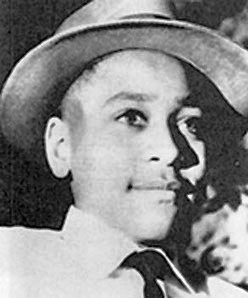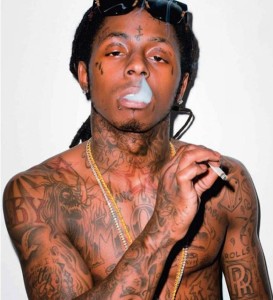Pop a lot of pain pills
Bout to put rims on my skateboard wheels
Beat that p@$$y up like Emmett Till
Yeah
This time rap mogul, Lil Wayne has crossed the line with his controversial lyric from Future’s remix, Karate Chop. Lil Wayne’s reference to civil rights martyr, Emmett Till, a 14-year boy from Chicago who was brutally tortured and lynched for allegedly whistling at a white woman while visiting Mississippi in 1955 was both irresponsible and just plain stupid (Cubarrubia, 2013).
Till was severely beaten, eyes gouged out and shot in the head before his attackers tied a cotton gin fan to his body and barbed wired and tossed it into a river (AP, 2013). Two white men were acquitted of the murder by an all-white jury. After Till’s body was returned to his mother, she insisted on an open casket for his funeral. The images of his battered body help pushed civil rights into the cultural conversation (AP, 2013).
Both Lil Wayne and his record label, Epic were prepared to release the song unedited until the project was leaked and all hell broke loose. The Till family’s attorneys contacted Lil Wayne to express their disdain for his distasteful lyrics as well as the disrespect shown to their loved one (Cubarrubia, 2013).
To make matters worse Lil Wayne lost a multi-million dollar deal with PepsiCo over the lyric controversy (AP, 2013). The soft drink giant cut all ties with the pop idol. According to a statement from PepsiCo, “Wayne’s offensive reference to a revered civil rights icon does not reflect the values of our brand” (Cubrrubia, 2013). Lil Wayne was to be the next spokesperson for the company’s Mountain Dew brand.
Lil Wayne offered a written apology to the Till family saying that he would not reference Till or the family in his music especially in an inappropriate manner (AP, 2013). Lil Wayne’s record label, Epic also issued an apology to the Till family stating that the record that was leaked was not the final release (Cubarrubia, 2013).
Exactly what makes rappers so careless when it comes to their lyrics? TI says that people simply do not understand the rap game or a rapper’s lifestyle and goes on to say that Lil Wayne had a brief lapse in judgement (White, 2013). TI goes on to say that his friend, Lil Wayne made a bad decision. Or could it be that Lil Wayne or anyone in his camp was too lazy to research the reference.
I am not a big fan of rap music but it boggles the mind that rappers and Hip Hop artists don’t take the time to research some of the material they include in their lyrics especially at a time when there is so much racial unrest in this country. Groups like the Tennessee Tea Party are requesting that the references to the Founding Fathers being slave owners be removed from textbooks (Schilmoeller, 2012).
In 2015, students in Texas began using social studies books that all but erased Black History from the pages of the reference guides (Brown, 2015). With that in mind, there is even a bigger issue looming overhead what do we do to hold rappers, athletes and other influencers accountable for the work that they produce. Especially when when they have so much influence over the next generation.
How do we begin to educate rappers and other entertainers about the importance of producing lyrics there are expressions of their lifestyles without going to the extreme and offending the masses? What happens when they are approached by companies who are willing to pay top dollar to represent their brands and ignore the moral compass that helps that holds them accountability to the rest of the Black community?
The next time Lil Wayne decides he wants to add a reference from Black History in one of his lyrics, he will do his homework first.
References
Associated Press (2013, May). Lil Wayne Loses Pepsi Deal Over Emmett Till Lyric Controversy. Billboard. Retrieved from http://www.billboard.com/articles/news/1560660/lil-wayne-loses-pepsi-deal-over-emmett-till-lyric-controversy
Associated Press. (2013, May). PepsiCo agrees to Meet With Till Family, Sharpton. Black America Web. Retrieved from http://blackamericaweb.com/2013/05/07/pepsico-agrees-to-meet-with-till-family-sharpton/
Brown, E. (2015, July). Texas officials: schools should teach that slavery was ‘side issue’ to civil war. The Washington Post. https://www.washingtonpost.com/local/education/150-years-later-schools-are-still-a-battlefield-for-interpreting-civil-war/2015/07/05/e8fbd57e-2001-11e5-bf41-c23f5d3face1_story.html
Cubarrubia, R.J. (2013, May). Lil Wayne Apologies for ‘Inappropriate’ Emmett Till Lyric. Rolling Stone. Retrieved from http://www.rollingstone.com/music/news/lil-wayne-apologizes-for-inappropriate-emmett-till-lyric-20130501
Schilmoeller, J. (2012, February 1). Rewriting history: erasing white guilt from American textbooks. Mint News Press. Retrieved from http://www.mintpressnews.com/rewriting-history-erasing-white-guilt-from-american-textbooks/19527/
Urist, J. (2015, February). Who should decide how students learn about America’s past? The Atlantic. Retrieved from http://www.theatlantic.com/education/archive/2015/02/who-should-decide-how-students-learn-about-americas-past/385928/
White, C. S. (2013, May). Future Praises Lil Wayne’s Emmett Till Lyric For Its Positivity. Black America Web. Retrieved from http://blackamericaweb.com/2013/05/15/future-praises-lil-waynes-emmett-till-lyric-for-its-positivity/



4 Responses to Don’t Write a Check with Lyrics That Your Donkey Can’t Cash